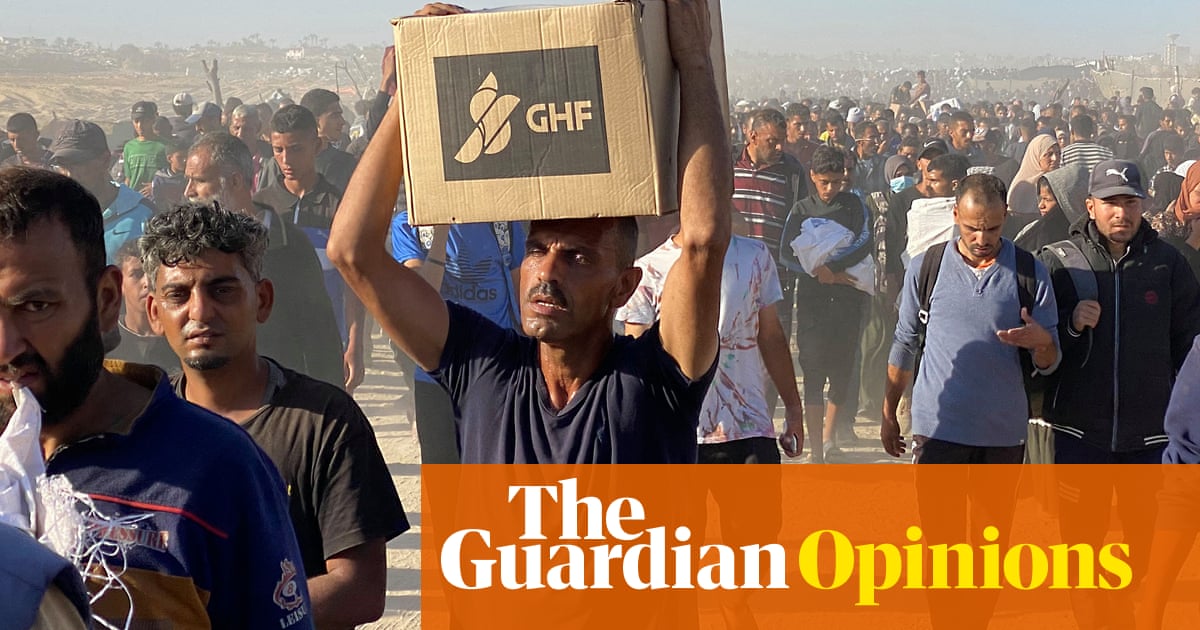Afull, independent investigation into thekillings of Palestiniansattempting to collect food for their family, and accountability for their deaths, is essential. But no investigation is needed to establish that Israel is ultimately responsible, by starving people and then implementing a food-collection scheme that cannot solve the humanitarian crisis, and which is known to be dangerous. The US, which promoted that scheme, is complicit.
Health officials in Gaza say that at least 27 people were killed by Israeli fire as they awaited food on Tuesday – thethird such incidentin three days. (The Israeli military said troops fired at people “moving towards [them] … in a way that posed a threat”.) Officials previously said that Israeli forceskilled more than 30 Palestinianson Sunday, and another three the following day; the military said they did not shoot civilians, but fired “warning shots”. The Gaza Humanitarian Foundation (GHF) – the American private organisation running the scheme –suspended operationson Wednesday for “update, organisation and efficiency improvement work”.
No update can fix this: the food scheme itself is the problem. The UN and aid agencies feared that it breached international law and refused to work with the GHF; the founding directorresigned, saying that GHF would not be able to deliver aid while adhering to humanitarian principles. Senior Israeli military officials reportedlyraised concerns. Many people cannot reach the sites. Those who do face a greater risk of having meagre supplies snatched by other desperate people. Essential non-food goods such as medications are not included. The risk of shootings was clear: armed American contractors run the three sites and Israeli troops control the surrounding areas. Palestinians are forced to choose – risk their lives or watch their children starve.
After 11 weeks of total siege, followed by a trickle of supplies, Gaza isthe hungriest place on Earth, says the UN. It was never plausible that this scheme could feed it. It is a fig leaf for Israel’s continued starvation of civilians, and helps displace them to an ever smaller area. The far-right minister Bezalel Smotrich hassaidthat Gaza will be “entirely destroyed” so that its population will “leave in great numbers to third countries”. In short, ethnic cleansing.
The use of food as a weapon comes in addition to strikes on schools being used as shelters, the destruction of hospitals and the killing of tens of thousands of civilians. Israel’s war crimes have caused public support toplummetin western Europe and fall markedly in the US. Yet politicians are lagging. Sir Keir Starmer calls the situation “intolerable”, but until the UK acts decisively it is, in reality, tolerating it. The UK, France and Canada warned of “concrete measures” and must follow through. The US could stop this conflict tomorrow, but the European Union, Israel’s biggest trading partner, alsohas real power. It is now reviewing its trade agreement with Israel; it should suspend it. Improving aid is a necessary but not sufficient demand. The need is created by the war. The real solution is still a ceasefire and release of the hostages seized by Hamas on 7 October 2023.
As Mirjana Spoljaric, president of the International Committee of the Red Cross,has warned, international law itself is being hollowed out – with profound implications for conflicts to come. As long as Israel enjoys impunity, more Palestinians die and human lives everywhere are cheapened. It must be held accountable.
Do you have an opinion on the issues raised in this article? If you would like to submit a response of up to 300 words by email to be considered for publication in ourletterssection, pleaseclick here.
